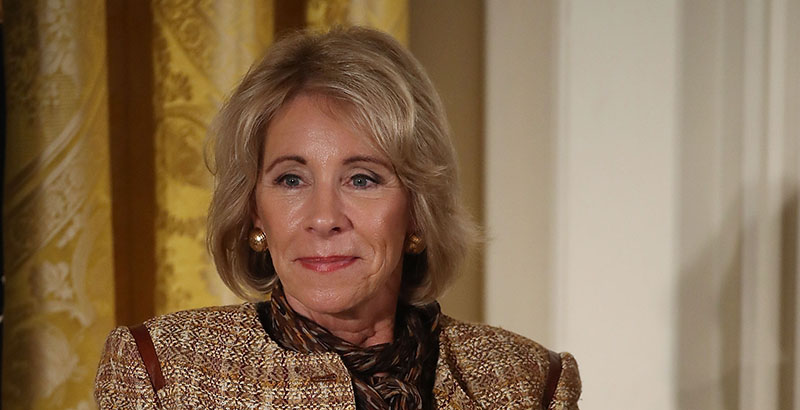Evan Stone: DeVos Must Listen to Teachers and Support Students, Not Suspend Them

In a speech two weeks ago, Secretary of Education Betsy DeVos said she couldn’t think of a single successful Obama or Bush education initiative. I can think of several that this administration has already rescinded or is considering ending. For example, our former president’s guidance to empower districts, schools, and teachers to end our country’s suspension and expulsion pandemic and reduce racial disparities in school discipline.
In 2014, the year President Barack Obama issued the guidance to rethink school discipline, 2.6 million students were suspended from our public schools. That’s about 1 out of every 19 students, including almost 250 preschoolers, suspended or expelled each day. Students are most often suspended for minor nonviolent behavior, including infractions as minor as having a broken pencil sharpener. And the data show that students of color and those with disabilities are disproportionately affected by this exclusionary discipline.
The logic for reducing the use of exclusionary discipline is clear. When kids are out of school, their grades and learning suffer. Without a strong academic foundation, they have fewer options in life. Young students who are suspended or expelled are up to 10 times as likely to experience failure in their academics, drop out, and become incarcerated.
Harsh discipline doesn’t help students learn to make better decisions or care more about their academics and peers. In fact, it directly conflicts with our role as educators, which is to help children grow academically and socially. Suspending students is the opposite of accountability; it’s a temporary Band-Aid that deprives students of the chance to atone for their behavior while sending them a clear message that they don’t belong.
Educators know that we can’t just suspend students — we must support them. In part because of the national conversation sparked by the Obama administration guidance, Educators for Excellence teachers in Chicago hosted forums for educators, families, community members, and the district to collaborate to improve school environments and safety. In Minnesota, E4E created an action guide to help teachers move toward nonexclusionary discipline. And there are scores of other examples of how this guidance has shifted resources to help teachers build relationships with their students, teach them how to behave, and avoid relying on expulsions and suspensions.
Opponents of this guidance say it strips teachers of a valuable classroom management tool, creating disruptive and unsafe schools. But the guidance does not ask schools to eliminate suspensions; instead, it proposes alternatives and highlights the racial disparities. Clearly, students who present a danger to others should be removed from the classroom; in the rare cases where students need to be suspended, there must be a process to facilitate their re-entry to the school community that rebuilds relationships and trust among all those affected.
But in cases of nonviolent misbehavior, which are currently the grounds for most suspensions, this guidance is meant to replace suspensions with proven and appropriate accountability methods that focus on the root causes of misbehavior, teach students to improve, and allow them to repair the damage to the school community.
This approach is not the easier option; it requires more time, resources, and teacher training. But when these conditions are present, and we give schools time to adjust and focus on early warning signs, this method improves student outcomes. In New York City, a pilot program that has implemented these strategies with necessary supports from the district decreased suspensions by 25 percent and behavior incidents by 19 percent in one year while improving safety ratings, according to New York City data collection.
Educators want to build on this success. Last month, as part of the “In Class, Not Cuffs” campaign, Educators for Excellence teachers from across the country testified in support of the guidance in a U.S. Commission for Civil Rights hearing and met privately with department officials, including Acting Assistant Secretary of the Office for Civil Rights Candice Jackson. They shared their personal experiences with both the damage suspensions cause and how the guidance has supported meaningful change in their school communities.
Yet despite educator support and evidence of its success, DeVos is reviewing the 2014 discipline guidance and may revoke it at any time. She was quick to dismiss this work in her recent speech but neglected to offer an alternative. Are we meant to return to relying on suspensions for even the most minor infractions? We’ve tried that for decades, and it doesn’t work. As part of her review, DeVos must meet with teachers, visit restorative classrooms, and speak with families before halting the progress our teachers have made.
Evan Stone is co–chief executive officer and co-founder of Educators for Excellence (E4E).
Disclosure: The Bill & Melinda Gates Foundation, Bloomberg Philanthropies, the California Community Foundation, the Carnegie Corporation of New York, The Eli and Edythe Broad Foundation, the Walton Family Foundation, and the William E. Simon Foundation support The 74 and Educators for Excellence.
Get stories like these delivered straight to your inbox. Sign up for The 74 Newsletter

;)
